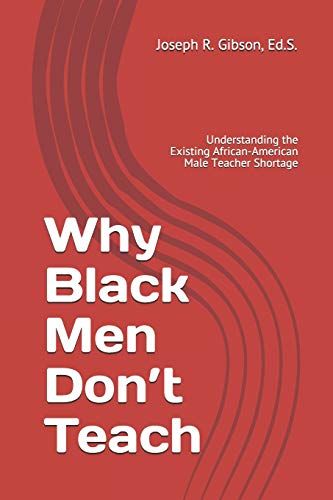Why Black Men Don't Teach
Understanding the Existing African-American Male Teacher Shortage
Joseph R. Gibson
BOOK REVIEW

The stark reality of the education system in America unfolds like a gripping drama in Why Black Men Don't Teach: Understanding the Existing African-American Male Teacher Shortage by Joseph R. Gibson. This isn't just a book-it's a clarion call. It dives headfirst into the chilling absence of African-American male teachers in classrooms across the nation. What drives this alarming shortage? What societal factors contribute to the exclusion of these vital voices from shaping the future generations? This book scrapes at societal wounds, peeling back layers of discomfort to expose raw truths that demand attention.
Gibson's work is more than a mere exposition of statistics and studies; it is a deep exploration of identity, culture, and systemic barriers. With razor-sharp analysis and compelling anecdotes, he challenges preconceived notions about education, race, and masculinity. It's an urgent invitation to confront the uncomfortable truths that many prefer to ignore-an education crisis concealed beneath the veil of normalcy.
As you navigate through its pages, you're propelled into the heart of the issue. The emotional weight of Gibson's narrative resonates deeply, urging you not just to read but to feel and reflect. He constructs a visceral connection between the reader and the plight of Black men in education. The struggles they face are not isolated; they echo through communities, impacting young minds who could immensely benefit from diverse role models in teaching.
The inquiry into why African-American males are often absent from teaching roles raises various critical points. Economic inequality looms large, pushing potential educators toward other professions that promise better financial rewards. Discrimination and stereotyping in educational spaces often serve as barriers, leaving many men feeling unwelcome or undervalued. The fear of navigating bureaucratic systems, often riddled with bias, further inhibits their entry into teaching roles.
Gibson doesn't shy away from addressing the psychological ramifications of these obstacles. He articulates the emotional toll that systemic racism exerts on aspiring Black male teachers. This isn't just a professional choice; it's a personal battle, filled with doubt and societal pushback. By bringing these stories to light, Gibson emphasizes that the absence of Black male teachers is not only a loss for the individuals wanting to teach but a devastating loss for the students missing out on their guidance.
Readers have had varied reactions to Gibson's poignant exploration. Some commend him for his insightful analysis and for bringing a marginalized topic into the spotlight. They appreciate his blend of personal narrative with empirical research, making the book both a scholarly work and a heartfelt cry for change. Others, however, express a desire for broader solutions, wondering if the book offers enough practical pathways to influence change in hiring practices or educational outreach.
The emotional depth of Why Black Men Don't Teach will unearth reactions you may not expect. You might feel outrage at the systemic failures, sadness for the young boys who lack role models, and hope for what change could unfold if we embrace diversity in education. As the pages turn, you can't help but be drawn into Gibson's passionate plea-each sentence a vivid reminder of the urgent need for representation in the classroom.
By the end, it becomes painfully clear: the absence of African-American male teachers is indicative of a broader societal issue. It's a call to arms for educators, policymakers, and individuals alike. The time has come to redefine the narrative, to rally for change, and to ensure that the future of education is rich with diverse voices.
If you're ready to face the uncomfortable truths at the intersection of race and education, Joseph R. Gibson's work will indeed leave you breathless-not just with the weight of its findings but also with the relentless drive to make a difference. Dive into this profound exploration, and you might just find yourself forever altered, equipped with insights that call for action. The fate of a generation rests, in part, on the pages of this captivating work; missing out on its lessons would be an unforgivable disservice to us all.
📖 Why Black Men Don't Teach: Understanding the Existing African-American Male Teacher Shortage
✍ by Joseph R. Gibson
🧾 115 pages
2020
#black #dont #teach #understanding #existing #african #american #male #teacher #shortage #joseph #gibson #JosephRGibson